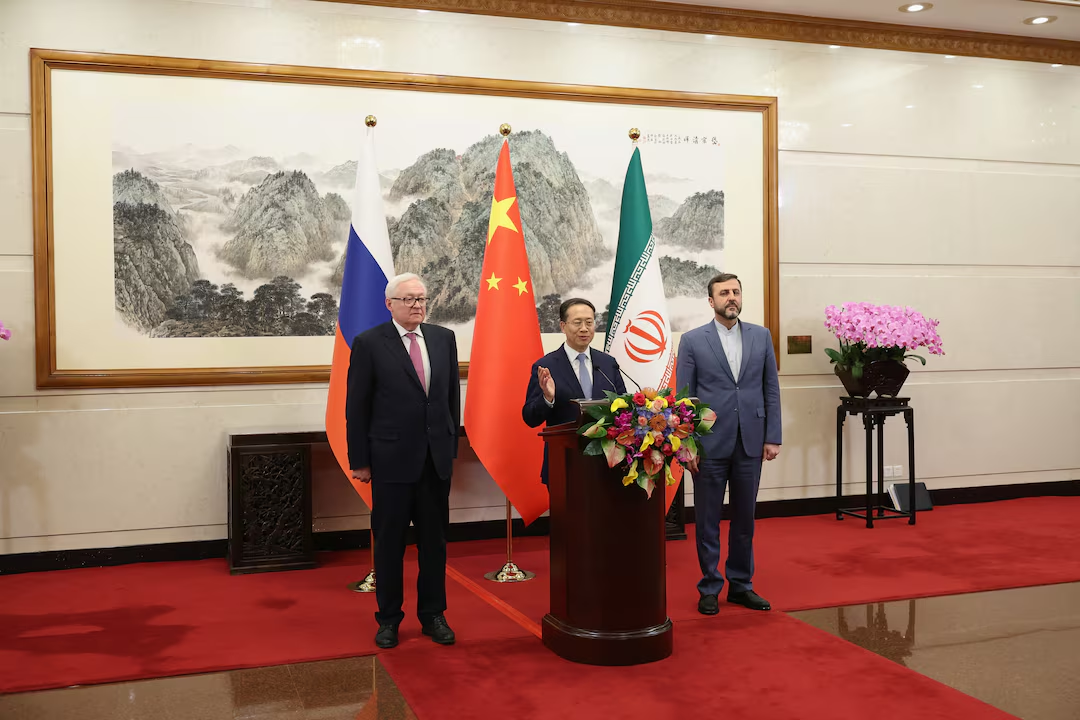China, Russia, and Iran Restart Nuclear Talks, Urge Mutual Support and End to Sanctions
Beijing, March 14 – Chinese and Russian diplomats have thrown their weight behind Iran amid renewed U.S. pressure for nuclear negotiations, calling for dialogue based on "mutual respect" and demanding the lifting of all unilateral sanctions. During a trilateral meeting in Beijing on Friday, senior officials from China, Russia, and Iran issued a joint statement reaffirming Tehran’s right to peaceful nuclear energy and condemning Western "coercive measures."
China, Russia, and Iran Restart Nuclear Talks, Urge Mutual Support and End to Sanctions
China, Russia, and Iran Restart Nuclear Talks, Urge Mutual Support and End to Sanctions
Beijing, March 14 – Chinese and Russian diplomats have thrown their weight behind Iran amid renewed U.S. pressure for nuclear negotiations, calling for dialogue based on "mutual respect" and demanding the lifting of all unilateral sanctions. During a trilateral meeting in Beijing on Friday, senior officials from China, Russia, and Iran issued a joint statement reaffirming Tehran’s right to peaceful nuclear energy and condemning Western "coercive measures."
Key Outcomes of the Trilateral Meeting
The talks, led by Chinese Vice Foreign Minister Ma Zhaoxu, Russian Deputy Foreign Minister Sergei Ryabkov, and Iranian Deputy Foreign Minister Kazem Gharibabadi, emphasized resolving the nuclear standoff through diplomacy. Ma stated, "Parties must abandon sanctions, pressure, and threats of force to address the root causes of tensions." The joint declaration reiterated that Iran’s nuclear activities are "entirely peaceful" and urged the international community to respect Tehran’s rights under global non-proliferation treaties.
Background: JCPOA and U.S. Withdrawal
In 2015, Iran signed the Joint Comprehensive Plan of Action (JCPOA) with the U.S., Russia, China, the UK, France, and Germany, agreeing to limit uranium enrichment in exchange for sanctions relief. However, former U.S. President Donald Trump unilaterally withdrew from the pact in 2018. Now, as Trump seeks to revive talks, Iran has rebuffed his approach, citing Washington’s "threat-based" rhetoric.
Iran’s Defiant Response to U.S. Ultimatum
Last week, Trump sent a letter to Iran’s Supreme Leader Ayatollah Ali Khamenei, warning that the U.S. would pursue "either a deal or military action." Iranian President Masoud Pezeshkian dismissed the threat, declaring, "Negotiations under coercion are unacceptable. We will not bow to U.S. dictates."
Controversy Over UN Security Council Meeting
A closed-door UN Security Council session on Iran’s nuclear program—initiated by the U.S., France, Britain, and three other members—drew sharp criticism. Iran labeled the move a "misuse of the Council," while Chinese Foreign Minister Wang Yi condemned the "hasty intervention," arguing it undermines trust-building efforts.
Analysts: Pragmatism vs. Geopolitical Posturing
Despite Iran’s tough stance, analysts note that crippling U.S. sanctions and rising domestic unrest could push Tehran toward pragmatism. However, the leadership remains publicly defiant, vowing to resist external pressure. Meanwhile, China and Russia’s diplomatic backing bolsters Iran’s negotiating position, though economic strain and geopolitical tensions cloud the path to a sustainable resolution.
Global Implications
The Beijing talks underscore deepening alliances among U.S. adversaries, even as the specter of escalation looms. With Trump’s threats clashing against Iran’s unyielding posture, the world watches anxiously to see whether diplomacy can prevail over confrontation in one of the most volatile nuclear standoffs of the decade.
Final Note:
While China and Russia’s support strengthens Iran’s diplomatic leverage, the enduring economic crisis and regional instability highlight the urgent need for a breakthrough. The international community remains divided, with hopes pinned on renewed dialogue to avert a broader crisis in the Middle East.










